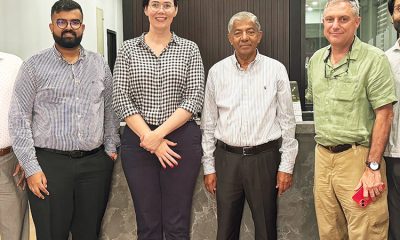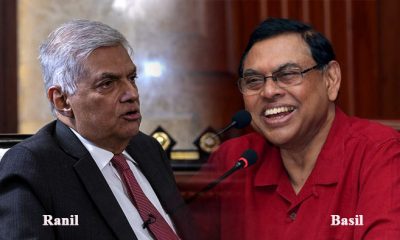Editorial
When truth becomes a casualty

Tuesday 14th June, 2022
Chairman of the Ceylon Electricity Board (CEB) M. M. C. Ferdinando has resigned over his recent statement, before the COPE (Committee on Public Enterprises), that Indian Prime Minister Narendra Modi had pressured President Gotabaya Rajapaksa to award the Mannar wind power project contract to India’s Adani Group. Ferdinando said President Rajapaksa had, after a meeting, told him that the latter was under pressure from Modi to ensure that Adani clinched the deal. But the President promptly denied his claim. (In this country, people do not believe anything until it is denied!)
There was absolutely no need for Ferdinando to lie before the COPE, but now he tells us that he mentioned the Indian Prime Minister’s name by mistake due to ‘unexpected pressure and emotions’ at the COPE meeting. But there was no hostile environment at the COPE meeting, as evident from the video footage of the event, and Ferdinando looked composed. In fact, when he revealed what the President had told him, he even smirked. It was obvious that he made the statement at issue in good faith in a bid to bolster his argument that the power plant project was a government-to-government one because the Indian Prime Minister himself had evinced a keen interest therein. But he did not realise the diplomatic and political ramifications of his statement.
Ferdinando’s disclosure about PM Modi having brought pressure to bear on President Rajapaksa on behalf of Adani has provided the Indian Opposition with ammunition. Gautam Adani is known as Modi’s Rockefeller, and the BJP government stands accused of going out of its way to help him. Modi has drawn heavy flak from the Congress for pushing for the wind power project on behalf of Adani. So, it is only natural that President Rajapaksa had to issue a rebuttal and the CEB Chief had to retract his statement and resign.
The issue of alleged Indian pressure over the wind power project cannot be considered closed simply because Ferdinando has withdrawn his statement. If one goes by his claim that his statement before the COPE was not true, then one can argue that he has violated parliamentary privileges by making a false claim to mislead the watchdog committee. More importantly, the peg on which he hung his argument that the Adani power project was a government-to-government deal was that according to President Rajapaksa, PM Modi had pushed for it. If Ferdinando has lied before the COPE, then the question is whether the project could be considered a government-to-government one.
When the Hambantota harbour was handed over to China on a 99-year lease, The New York Times said Beijing had leveraged its loans to make Sri Lanka cough up a port, of all things. What will the critics of Sri Lanka’s increasing dependence on India for loans say? Will they say India has got Sri Lanka to cough up a wind power project contract?
It will be interesting to see the reaction of the COPE to the outgoing CEB Chairman’s self-contradiction. Will it raise a privilege issue and call for action against Ferdinando? Or, will it just forget about it lest it should open a can of worms for both President Rajapaksa and PM Modi?
It is not difficult to get at the truth anent Ferdinando’s statement in question. He informed the COPE that he had told the President that the award of the contract for the wind power project was not under the purview of the CEB and it had to be handled by the Board of Investment; subsequently he had written to the Finance Ministry about what the President had told him and asked it to take follow-up action. This letter must be in the Finance Ministry if it has not been made to disappear.
Editorial
Diana under pursuit

Saturday 11th May, 2024
Now that Diana Gamage has lost her parliamentary seat owing to a Supreme Court ruling that she is not eligible to be a member of Parliament, a campaign has got underway to have state funds spent on her as an MP and State Minister recovered from her. The fact that she, a British citizen, had herself appointed a National List (NL) MP and held a ministerial post amounts to deception, according to her critics. This argument is tenable.
Ironically, among those who are all out to have ex-MP Gamage pay back taxpayers’ money spent on her for nearly four years are some SJB MPs, who have taken the moral high ground and are condemning her. The SJB leaders are deriving some perverse pleasure from Gamage’s predicament and are twisting the knife, so to speak. However, there is no way the SJB can absolve itself of the blame for Diana’s appointment to Parliament.
Those who formed the SJB, after leaving the UNP, struck a deal with Gamage and took over her party prior to the last general election. They made Gamage one of their NL nominees and subsequently appointed her to Parliament as part of their deal with her. The holier-than-thou SJB MPs had no issue with her NL nomination or her appointment to Parliament. They would not have been out for her scalp if she had not defected to the government. They claim to be privy to the government’s inner workings, Cabinet secrets, and clandestine deals the ruling party politicians cut. The SJB, therefore, cannot claim that it was not aware of Gamage’s British citizenship when it made her one of its NL nominees. The SJB leaders, in our book, are as culpable as Gamage on this score.
We believe that the SJB has a moral obligation to pay back 33.3% of the state funds spent on its NL MP Gamage and tender an apology to the public, whose franchise it violated with her appointment to Parliament.
The Rajapaksa government engineered Gamage’s crossover, and rewarded her with a ministerial post. Having benefited from Diana’s defection and caused a loss to the public purse, the government is duty bound to pay back 33.3% percent of the taxpayers’ money spent on her. One may recall that it went out of its way to suppress evidence against her to the point of making one wonder whether anything would come of the investigations into her citizenship issue. Thankfully, it failed in its endeavour.
Gamage, who had herself appointed to Parliament, in spite of being aware of her disqualification, ought to pay back the remaining 33.3% of the state funds spent on her. It may not be fair to make her pay the entire amount.
It is believed that there are several dual citizens in the current Parliament, drawing salaries and enjoying various perks at the expense of the public. The Department of Immigration and Emigration must be made to reveal information about the citizenship status of every MP. It is incumbent upon the party leaders to ensure that their MPs are not either foreign citizens or dual citizens. Opinion is divided on whether dual citizens should be allowed to be MPs, as we pointed out in a previous comment, but the lawmakers must abide by the provisions of the existing Constitution. The need for a new law to make it a punishable offence for anyone disqualified by the Constitution to enter Parliament cannot be overemphasised.
Editorial
‘Unhinged’

Friday 10th May, 2024
Derrick Borte’s edge-of-seat psychological thriller, ‘Unhinged’, has an appropriate tagline: ‘He can happen to anyone!’ We were reminded of this suspense flick full of gratuitous violence, and its catchphrase while reading newspaper reports that former Minister Mervyn Silva had recently been granted bail in a case pertaining to an incident which took place at the state-owned Rupavahini Corporation headquarters 17 years ago. The police must be asked to explain why they took so long to institute legal action against him. The mere mention of his name evokes dreadful memories of a dark era, when pro-government goons operated even alongside the police to crush political dissent and were free to kill anyone and carry out arson attacks.
The Sri Lanka police are known for their high-octane performance. They swing into action, arrest offenders and haul them up before court in double quick time. But they do so only when the culprits happen to be members of the marginalised sections of society, such as poor children who steal coconuts, unable to dull the pangs of hunger or pay school fees. These ‘brave’ men in uniform cringe and cower before powerful politicians and politically-connected thugs. That is why Mervyn and the members of his private army, who did dirty work for the Mahinda Rajapaksa government, remained above the law. It may be recalled that Mervyn tied a public official to a tree in full view of the police, in 2010, for being late to a meeting he had summoned. No action was taken against him for that serious offence.
In 2007, Mervyn and some thugs stormed the Rupavahini headquarters, demanding to know why a speech he had made in Matara, a few days before, insulting Mangala Samaraweera, had not been telecast. He turned aggressive only to be gheraoed and roughed up by the irate Rupavahini workers. It was a case of the hunter being hunted, and the police had to step in to secure the release of Mervyn and his netherworld chums.
The Rajapaksa government, true to form, defended Mervyn to the hilt. It was the Rupavahini workers who were interrogated by the police over the 2007 incident! A few months later, some of them came under knife attacks and the victims suffered in silence.
The culture of political violence and impunity is far from over, and the blame for this sorry state of affairs should be apportioned to successive governments and their leaders as well as others who have used violence as a means to achieve their political goals.
Dangerous underworld figures such as Kalu Lucky and Gonawala Sunil carried out attacks on the political opponents of the J. R. Jayewardene government, suppressed the media, stoned judges’ houses and stuffed ballot boxes; the Ranasinghe Premadasa administration had underworld armies led by the likes of Soththi Upali to suppress democratic dissent, terrorise the Opposition and the media, and rig elections. The Chandrika Kumaratunga government, which came to power promising to eliminate political violence, used criminals such as Beddegana Sanjeewa and the Presidential Security Division personnel to terrorise and harm its opponents; the Rajapaksa regime had many underworld figures such as Wambotta to crush protests and attack opposition activists, journalists and media organisations. In the late 1980s, the JVP used numerous sparrow units to carry out political assassinations, and its ‘enforcer’, Lionel Ranasinghe, killed 41 persons including Vijaya Kumaratunga, according to his confession to the police, published verbatim in Dharman Wickremaratne’s book, ‘Comrade Lionel’. The TNA defended the LTTE, acted as its mouthpiece, and sought to justify its terror.
Pareto has said that when a regime change occurs one set of elites is replaced by another, and he has called this process ‘the circulation of elites’. It can be argued that something similar happens in the underworld with criminal gangs replacing one another when regime changes occur. Mervyn switched his allegiance to President Maithripala Sirisena, who promised to usher in good governance, after the fall of the Rajapaksa government in 2015. Today, he is one of the bitterest critics of the Rajapaksas, whose slippers he once offered to lick to prove his loyalty to them.
Different as all political parties that have been in power or are seeking to savour it may be, in some respects, a common denominator among them is their readiness to resort to violence to protect self-interest. As for the upcoming elections, the Sri Lankan public has been left with a choice between some capitalist parties that do not hesitate to unleash violence to protect their interests and a bunch of pseudo-Marxists who are unrepentant about their past crimes.
Editorial
Diana’s ouster

Thursday 9th May, 2024
Overturning an Appeal Court ruling, the Supreme Court (SC) has determined that State Minister Diana Gamage, a National List MP of the SJB, is not eligible to be a member of Parliament. She has lost her parliamentary seat, as a result. Thus, a protracted legal battle over the issue of Gamage’s citizenship status has come to an end. If Osala Herath, a social and political activist, had not resorted to legal action against Gamage, insisting that she was a British citizen, she would have continued to be an MP until the dissolution of the current Parliament.
The SC decision in the case against Gamage, a powerful figure in the government, has bolstered public esteem for the apex court significantly. After Gamage’s defection from the SJB, the government went all out to shield her by suppressing evidence against her, and rewarded her with a ministerial post. Key state officials were prevented from revealing information that was detrimental to her interests, and it looked as if the SLPP-UNP combine had been trying to have investigations into the complaint against her drag on until the dissolution of Parliament. But its plan went awry, and the law finally caught up with her.
Worryingly, it takes an inordinately long time for a person who enters Parliament unlawfully to be expelled. If the SLPP’s efforts during the past few months to have Parliament dissolved had reached fruition, the SC determination under discussion would not have affected Gamage at all. It was obvious that the government was hoping for such an eventuality.
There is a pressing need for the cases challenging the MPs’ eligibility to sit in Parliament to be concluded expeditiously because the election or appointment of disqualified persons to Parliament amounts to a blatant violation of the people’s franchise. Stringent action should be taken against those who willfully cause delays in such cases by refusing to furnish required information or through other means. Delays on the part of the Department of Emigration and Immigration in respect of the provision of information pertaining to the case against Gamage must not go uninvestigated, and the officials concerned must be made to explain their allegedly tardy and evasive responses.
The SJB must accept blame for having appointed a person disqualified from being an MP to Parliament. Its leaders claim to be au fait with the law; they made a hue and cry about Gotabaya Rajapaksa’s citizenship ahead of the 2019 presidential election, and there is no way they can claim that they were unaware of Gamage’s disqualification at the time of her appointment to Parliament.
Gamage’s disqualification adversely impacts the integrity of Parliament. She functioned as a State Minister, made important decisions, reportedly drew her salary and enjoyed various perks at the expense of the public. Shouldn’t the costs thereof be recovered from the MPs who are unseated on legal grounds?
Opinion may be divided on whether dual citizens should be allowed to serve as MPs. However, those who have violated the current constitutional provisions must be dealt with according to the law. It is believed that there are some more MPs who should be unseated because they are dual citizens. If so, it is imperative that legal action be instituted against them as well.
The leaders of the political parties represented in Parliament never miss an opportunity to take moral high ground and pontificate to others. They also rant and rave against other state institutions. Shouldn’t they put their own house in order before being critical of others? Let them be urged to ask their MPs who are believed to have been dual citizens at the time of their election or appointment to the current Parliament, while the constitutionally-stipulated disqualification of dual citizens at issue was in effect, to resign forthwith.
-

 News7 days ago
News7 days agoLankan wins UK’s prestigious hair and beauty awards 2024
-

 Business7 days ago
Business7 days agoUSDA Under Secy Taylor visits New Anthoney’s Farms and commends its pursuit towards sustainable poultry practices
-

 News7 days ago
News7 days agoVisa scandal exposed after airport chaos
-

 News6 days ago
News6 days agoSLPP renews call for early general election after UNP’s poor May Day show
-

 Sports2 days ago
Sports2 days agoNestle Milo empowers Sri Lanka’s future football stars
-

 Features6 days ago
Features6 days agoCan we quantify research performance and rank scientists?
-

 Editorial7 days ago
Editorial7 days agoMay Day signals
-

 Features6 days ago
Features6 days agoDeplorable Debt: Is Sri Lanka caught between IMF and IIF?



























